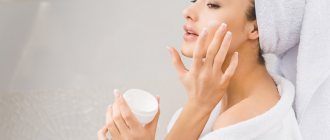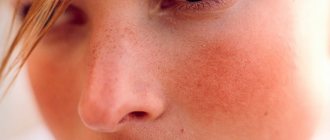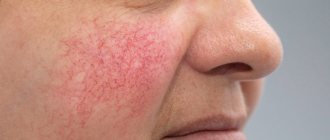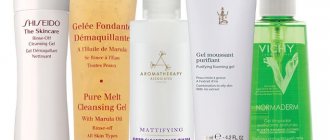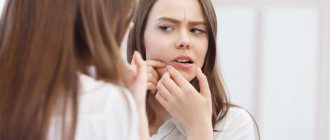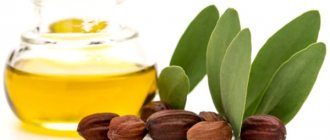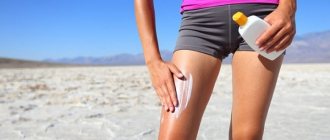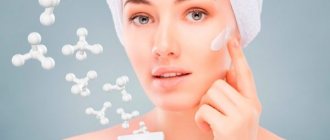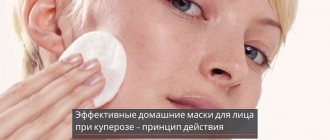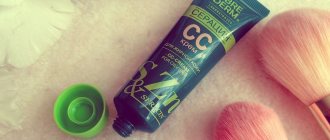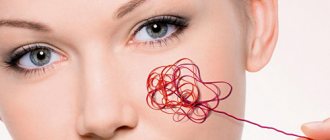If you don’t know what rosacea is, you are one of the happiest girls, because a light blush and visible mesh is a manifestation of a special condition of blood vessels and skin.
The first signs of rosacea are very easy to notice.
At first these are thin stars of blood vessels on the cheeks and around the nose, then they are added to the general blush of the skin and the glow of the cheeks after frost; Over time, persistent spots and areas of swelling appear. With age, rosacea does not go away, but only intensifies: the dermis becomes thinner, and dilated blood vessels and cyanotic nodules become clearly visible on the skin.
Table of contents
- Etiology and pathogenesis
- Clinical manifestations
- Principles of treatment, hardware methods for treating rosacea
Cuperosis (dilated capillaries, couperose-prone skin, couperosa) is a persistent local expansion of small capillaries with thickening and a pronounced decrease in the elastic properties of their walls, as well as blood stagnation. Unlike rosacea, it almost never goes away on its own.
In our company you can purchase the following equipment for the treatment of rosacea:
- M22 (Lumenis)
- AcuPulse (Lumenis)
- Fraxel (Solta Medical)
- UltraPulse (Lumenis)
There are no statistical data on rosacea as an independent nosology, however, it is believed that, together with rosacea, rosacea affects from 1% to 22% of the population, depending on the region of residence.
Etiology and pathogenesis of rosacea
The etiological factors of rosacea can be divided into endogenous and exogenous.
Endogenous factors include the influence of heredity. A decrease in the elasticity of the vascular wall is a genetically determined condition, which can be aggravated by various provoking (exogenous) factors - heat, cold, hormonal imbalance, somatic diseases, weakness of the valve apparatus of the veins of the lower extremities, etc.
Among the exogenous factors, it is worth highlighting the following:
- Nervous strain - in this case, large main vessels narrow, which increases the pressure in them, and the vessels of the peripheral network, on the contrary, expand.
- Smoking - promotes spasm and decreases the strength of the vascular wall.
- Diet - too hot, spicy or salty food, frequent and/or heavy consumption of alcoholic beverages provoke exacerbation and progression of rosacea.
- Climate - this includes ultraviolet radiation, prolonged exposure to strong gusty winds, cold or too hot and humid climate.
- Lifestyle - rosacea can worsen after visiting a sauna or bathhouse, with mechanical pressure on the skin (wearing tight synthetic clothing), while working with formaldehyde, etc.
Food triggers for rosacea are similar to those for rosacea. This includes hot tea and coffee, wine, strong alcohol, products with capsaicin (spices, hot sauces, hot and red peppers) and with cinnamaldehyde (tomatoes, chocolate, citrus fruits).
There is evidence that disruption of the microbial composition of the skin can provoke dysfunction of the epidermal barrier, which increases the skin's sensitivity to external factors and contributes to the development of rosacea.
Budget creams
Nature Siberica “Protection and Moisturizing”
The cream from the Russian manufacturer Nature Siberica “Protection and Moisturizing” is considered an effective remedy for redness that appears on the face. Nature Siberica's products have long established themselves as high-quality, natural and safe. Users note that the cream moisturizes and nourishes the skin well, coping well with minor redness. The composition includes only natural ingredients such as Rhodiola rosea extract, allantoin, vitamin P and hyaluronic acid, it also contains SPF factors for protection, all this not only helps fight small spider veins, but also smoothes out small wrinkles. The product is suitable for daily use, but due to its texture it is used only in the warm season.
Nature Siberica cream “Protection and Moisturizing”
Advantages:
- quality;
- natural composition;
- fights redness and wrinkles;
- contains SPF protection;
- packaging with dispenser;
- price.
Flaws:
- suitable for the warm season.
Bark Capillary protector
Another Russian manufacturer, multifunctional cosmetic, equipped with modern equipment, an accredited research laboratory and a laboratory that controls the raw materials used and finished products. In addition, the company has other services that help produce high-quality products. The cream contains thermal water, betaine, verbena, vitamin C, as well as green tea and avocado oils. The composition removes spider veins and redness, strengthens capillaries and slows down the aging of the skin. The capillary protector should be used once twice a day; with regular use, users notice an evenening of the complexion and the smoothing of fine wrinkles.
cream Bark Capillary protector
Advantages:
- natural composition;
- effective action;
- safety of use;
- affordable price.
Flaws:
- high consumption of the mixture due to the inconvenient jar.
Clinical manifestations of rosacea
There are 4 stages of rosacea:
- Stage 1 - under certain conditions (for example, in a hot room with dry air), the patient may experience erythema and irritation on the face. Against the background of erythema, several dilated capillaries become noticeable.
- Stage 2 - gradually dilated capillaries unite into a network, and the vessels are colored more brightly.
- Stage 3 - congestive erythema appears with individual or multiple telangiectasias. A network of dilated capillaries, mainly in the central third of the face, becomes clearly visible.
- Stage 4 - the visibility of capillaries increases, vessels on the entire surface of the face are involved in the pathological process. Areas of local blanching appear as a result of capillary spasm.
By studying the etiological factors and assessing the clinical manifestations of rosacea, we can conclude that this condition is similar to rosacea. Indeed, they have a lot in common - there is even an opinion that rosacea is the next stage in the development of rosacea. However, with rosacea, large and small vessels are affected, while with rosacea, only small ones are affected. Other differences between these pathologies are presented in table. 1 .
Table 1. Main differences between rosacea and rosacea
| Characteristic | Cuperosis | Rosacea |
| Localization | Typically occurs on the nose, cheeks and cheekbones. | Usually the central third of the face is affected - the cheeks and wings of the nose. |
| Epidemiology | It is observed in adults of any gender and age, but more often after 40 years. | It is observed in women aged 35–65 years with fair skin, most often in menopause. |
| Etiology | Inheritance, stress, smoking, climate, lifestyle. | Inheritance, Demodex mites, disruption of the immune system, abnormal signal transmission to blood vessels, microflora dysbiosis. |
| Clinic | The main symptom is telangiectasia, the number of which increases over time. In the future, the skin may become flabby and dry, and peeling occurs. With rosacea, triggers cause dilation of blood vessels, which subsequently do not narrow to normal diameter. | Erythema and telangiectasia on the cheeks and forehead, inflammatory papules and pustules - mainly in the nose, forehead and cheeks. When the lesion affects the sebaceous glands, rhinophyma may occur. In the ophthalmic type, injection of conjunctival vessels is observed. |
| Flow | Chronic, almost never goes away on its own. | Chronic, in mild cases it can go away on its own when the provoking factors (triggers) are eliminated. |
How to cure
It is necessary to start treatment at the initial stage of manifestation, that is, as soon as redness begins to appear. The sooner treatment is started, the more favorable the outcome will be. At the initial stage of the disease, you can cope with the disease at home, using special cosmetics and following the recommendations given below.
If a person has a predisposition, then he needs to start caring for the dermis as early as possible, so that after 35 years he does not have to resort to salon procedures.
If the problem is not corrected in a timely manner, it will not be possible to strengthen the blood vessels at home.
Treatment recommendations:
- You should not do aggressive chemical procedures on the skin, peelings, cryomassages, etc. Also, you should not steam the skin, resort to contrast washing and cleansing with scrubs with large abrasives.
- Caring cosmetics should not contain coarse particles that can injure the epidermis.
- You should regularly take vitamins such as PP, ascorbic acid, A and E.
- At home, you can use cosmetics, masks or creams that contain mineral complexes and vitamin C.
- It would be a good idea to use tonics based on herbal decoctions or wipe your face with green tea.
- It is imperative to use moisturizing creams with spf, which will protect the epidermis from the negative effects of the sun. In winter, SPF 15 will be enough, and in summer it is best to choose the best sunscreen with SPF above 30-50.
- You should reconsider your diet, since with rosacea it is necessary to exclude spicy, salty or spicy foods.
You can read about cleansing masks at home in this article.
Dermatologists often prescribe not only topical treatment, but also oral tablets.
The main medications are:
- Ascorutin is a vitamin set that helps strengthen the walls of blood vessels. The duration of taking the drug is determined by the doctor based on the clinical picture of the disease.
- Vikasol is a synthetic vitamin K, which is also necessary for the skin. As a result of using the medicine, the elasticity of the skin increases and blood microcirculation improves.
- Troxevasin is a capsule that is most often prescribed along with a cream for severe cases of the disease.
These medications can be purchased at the pharmacy, but you should not resort to self-medication, since the dosage and duration of medication should be prescribed by a doctor.
Principles of treatment of rosacea
The primary treatment strategy for rosacea is avoidance of trigger factors . Each patient has an individual set of such factors and is determined empirically. Avoiding triggers is necessary to avoid exacerbations and progression of the disease.
An important therapeutic point is the fight against stress . Normalization of the psycho-emotional state and, in particular, the work of the autonomic nervous system helps prevent exacerbations of rosacea and its further aggravation.
One non-medicinal method is the use of cosmetics . Properly selected makeup hides redness of the skin and allows such patients to feel comfortable in public places.
UV filters every day . Preference should be given to physical filters - zinc oxide and titanium dioxide, as they are better suited for sensitive skin.
Among the cosmetic ingredients for rosacea, the following are recommended: horse chestnut (Aesculus Hippocastanum), nettle extract (Urtica Dioic Extract), ivy extract (Hedera Helix Leaf Extract), Asian centella extract (Centella Asiatica Extract), green tea extract (Camelia Sinensis Leaf Extract) , blueberry extract (Vaccinium Angustifolium Extract), vitamin K.
For rosacea, you can use electrosurgery - this method is suitable for removing small and medium-sized vessels. It is recommended to use multiple short microcoagulations at low energy levels with a distance of 1–2 mm between them. You should start with the most visible vessels and gradually move towards the center of the face.
Medicinal methods (for example, topical digoxin) have a rather weak effect, but can be used as maintenance therapy.
A real breakthrough in the treatment of rosacea has become methods of percutaneous photocoagulation of blood vessels , which are implemented using various lasers, as well as IPL systems. The principle of operation of all these devices is selective photothermolysis: heating and destruction (thermolysis) of surface vessels due to the selective absorption of radiation by hemoglobin.
The most common option is to use IPL therapy, such as M22-IPL. Effective treatment of rosacea using IPL is characterized by simplicity, high speed of procedures and a minimal rehabilitation period. In some cases, IPL therapy is combined with the use of an Nd:YAG laser: this is justified when it is necessary to coagulate deep-lying large vessels.
Questions from our users:
- rosacea treatment with pharmaceuticals
- rosacea cosmetology treatment
- rosacea professional cosmetics
- rosacea laser treatment or photorejuvenation
FAQ
What components have a positive effect on blood vessels?
These are vitamins. And even if the composition often contains plant extracts, the effect of the product is due precisely to the large amount of vitamins and microelements contained in these extracts. Let's look at them in more detail:
- Vit. PP (nicotinic acid) - improves blood circulation.
- Vit. K - prevents deposits on the walls of blood vessels and the formation of blood clots in capillaries.
- Vit. C - normalizes capillary permeability, antioxidant.
- Vit. E - antioxidant.
- B vitamins stimulate metabolic processes in the skin.
- Horse chestnut extract - contains all of the above vitamins (except vitamin E and PP) and other beneficial substances.
- Hyaluronic acid - retains moisture in the skin.
Ask your question
